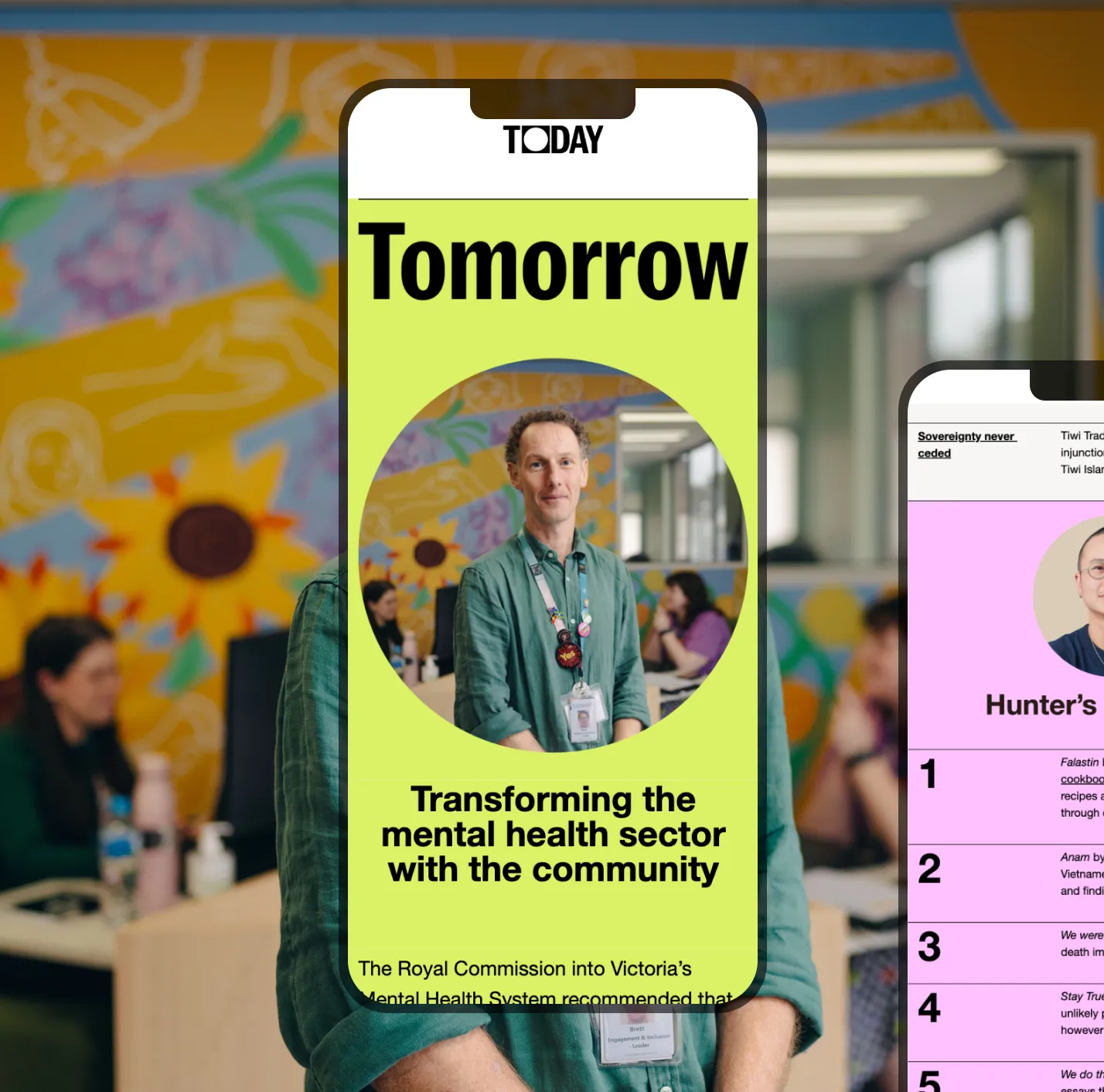Driven by formative experiences in her life, Anna Donaldson founded Lively —a social enterprise that connects generations, creates meaningful employment for young jobseekers, and reduces social isolation and loneliness amongst older community members.
Kate, Storyteller at Today, chatted to Anna about the importance of building authentic and reciprocal relationships in our community and what it takes to redefine an industry.
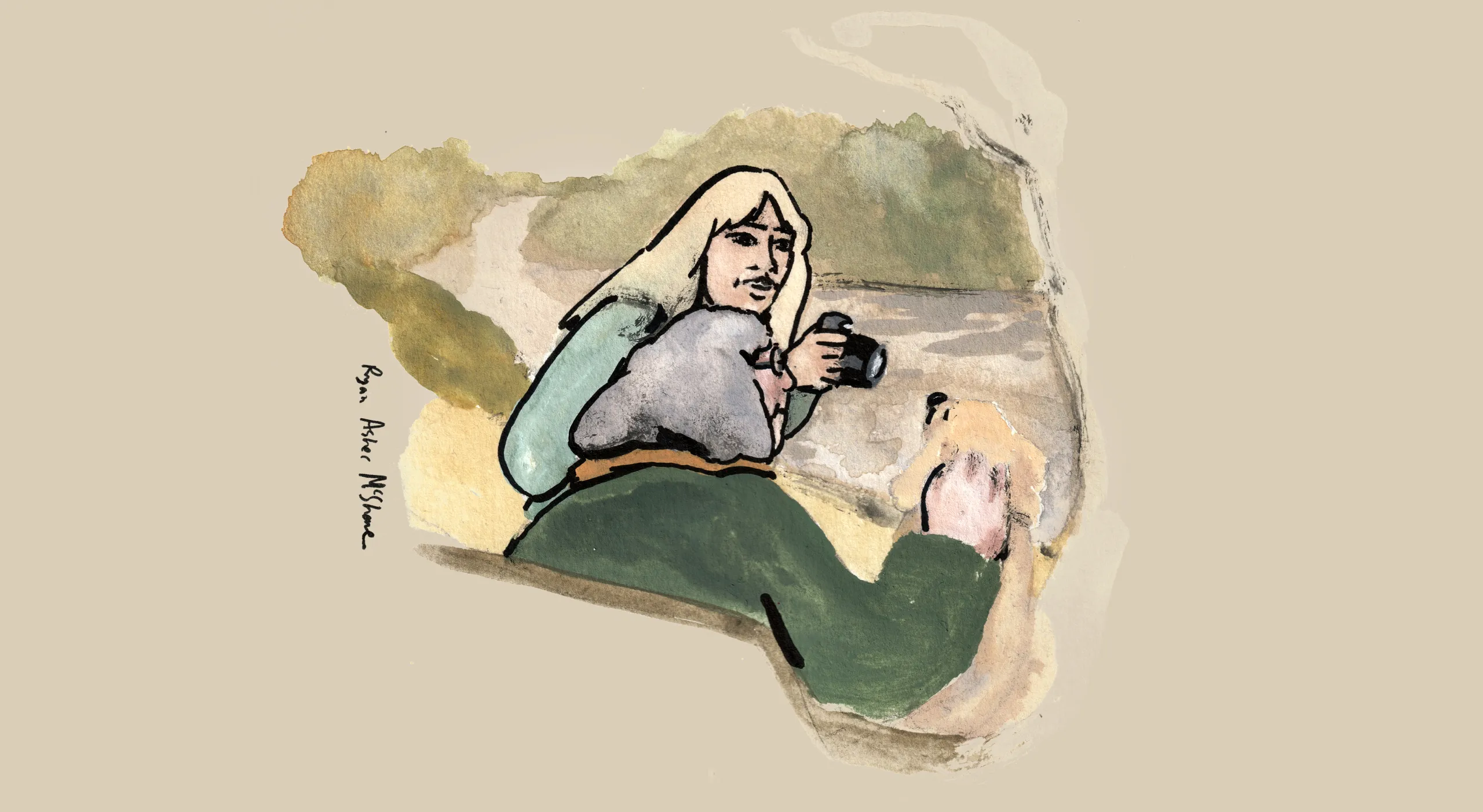
Can you start by introducing yourself?
Sure! My name is Anna Donaldson and I’m the Founder and CEO of Lively - a social enterprise that connects generations, creates meaningful employment for young jobseekers, and reduces social isolation and loneliness amongst older community members. Outside of my work on Lively, I’m also a Mum to two boys under two - one of whom arrived in the world just a few weeks ago! So there’s lots going on to keep me busy...
What was it that prompted you to start Lively?
The idea for Lively was born out of an experience I had as a volunteer during my early 20s. I was studying at the time and planning to pursue a career in international development, when I started volunteering on the side as a Life Story Writer for an aged care provider. Through the volunteer program, I was connected with an older lady named Patricia who wanted to write and publish her life story. I ended up visiting Patricia over a number of years—initially capturing her rich and fascinating life history, and as time passed, being there for her as a friend and companion. As a young person at the time, I learnt so much from Patricia and her life, but it was also a really confronting and eye-opening experience. Patricia was completely isolated and alone, and I was her only ‘personal’ connection towards the end of her life. After she passed away, I found myself increasingly conscious of and concerned by the issue of isolation amongst older people (which affects at least 4 in 10 older community members), and I became really motivated to do something about it.
At the same time, I was also concerned about youth unemployment, and was all too familiar with the experience of being knocked back from jobs due to ‘lack of experience’. I wondered how young people are supposed to get experience when nobody would give it to them in the first place! And I was interested in how we could create new forms of employment for young people, rather than building their employability skills (which lots of initiatives seemed to be doing) without ‘growing the pie’ of jobs available to them on the other end. Then one day I had a random lightbulb moment and saw the opportunity for these two issues to come together and solve each other - providing meaningful employment for young people to offer support and connection for people like Patricia.
Can you tell us a little more about how Lively is tackling youth unemployment and loneliness and isolation of the older community? What does that look like in practice?
Certainly! Lively’s model is simple but unique. We train and employ young jobseekers (aged 18-25) to offer ‘services’ that help older people maintain social connection, wellbeing and enjoyment of everyday life. We pair our older ‘Members’ with a young ‘Helper’ who they can get to know and work with consistently over time, and through these relationships we foster spaces for older people to also share their rich life experience and knowledge back with the young; fostering intergenerational understanding, awareness and respect (as well as young people’s personal development).
In practice, the services offered by our young Helpers include a range of different activities; help learning how to get online and use technology to connect and communicate, support to stay involved in gardening as a valued pastime and hobby, help getting out and about to engage in social activities or to pursue personal interests, and support to pursue personal ‘passion projects’ in whatever form these may come—from cataloguing family recipes to refurbishing an old set of chairs! We also have a home care service that engages young people who have care qualifications to offer more comprehensive care for older people who need formal support to remain living at home, including personal care and domestic assistance.
While the services and activities provided by our Helpers are always designed to meet specific needs for our older Members, I often refer to them as a ‘trojan horse’ - the activities are what bring young and older people into contact and relationship with each other in the first place, but most importantly, they provide a starting point and foundation for a meaningful connection and sense of two-way learning and exchange to emerge between them. For older people who are experiencing loneliness and isolation, we find that this provides a more dignified and empowering starting point than ‘paying for company’.
the activities are what bring young and older people into contact and relationship with each other in the first place, but most importantly, they provide a starting point and foundation for a meaningful connection and sense of two-way learning and exchange to emerge between them. For older people who are experiencing loneliness and isolation, we find that this provides a more dignified and empowering starting point than ‘paying for company’
Anna Donaldson
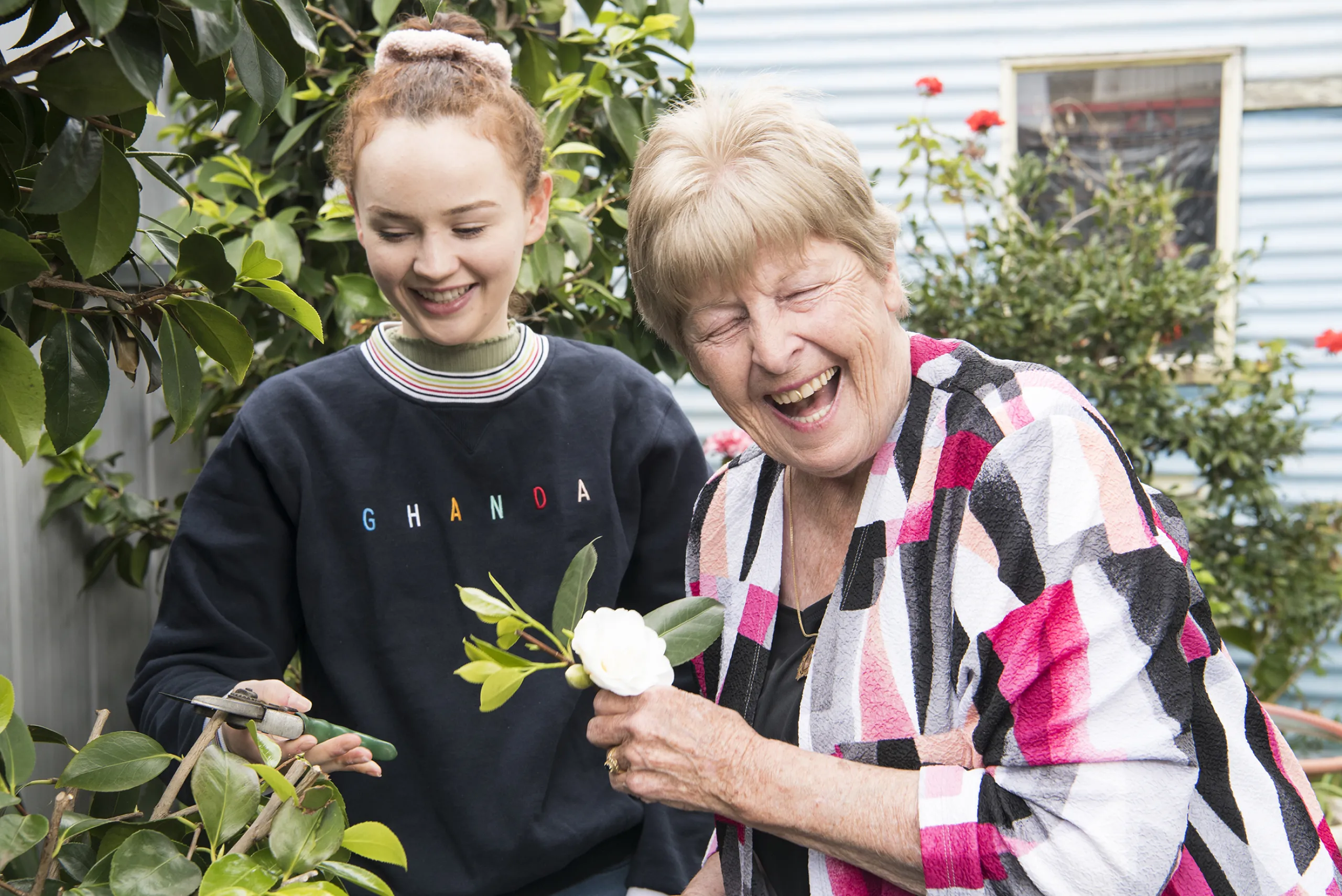
In conversations we’ve had you’ve talked about the ‘heart’ of Lively and what makes it unique as an organisation. I imagine this ‘heart’ is linked to Lively’s theory of change? Perhaps you can share more on this with us?
Yes - to me the ‘heart’ lies in the relationships and connections that we foster between young and older people, and the unique, individual directions that these invariably take. These relationships transform what could otherwise be ‘just a job’ for young people or a transactional service for older people, to create something much more meaningful and life-affirming - relationships that bring both a greater sense of personal value, purpose and belonging in the broader community. To provide space for these authentic relationships to emerge, Lively is quite deliberate in providing lots of autonomy to our young and older people to determine how they work together, and we steer away from rigid policies and practices that ‘manage risk’ at the expense of empowering individual agency, creativity and adaptive problem-solving. I’d say that this approach is also a big part of the heart and soul of the organisation, and what I think makes it really special.
These relationships transform what could otherwise be ‘just a job’ for young people or a transactional service for older people, to create something much more meaningful and life-affirming - relationships that bring both a greater sense of personal value, purpose and belonging in the broader community
Anna Donaldson
How many young carers are working with Lively? I’m interested to learn how you find young people with varied skills to help older people with the hobbies and interests they have.
We currently have 57 young people working as Lively Helpers. In the past few years we’ve been able to create 105 jobs for young people, and have received over 2000 applications for these roles, so we’ve always been spoilt with access to a large number of values-driven, caring and conscientious young people who are adaptable to the many different needs and interests that our older Members bring. Our young Helpers consistently explain that the appeal of working with Lively is the opportunity to do casual work that feels meaningful and rewarding - work that gives them a sense of making a contribution and difference in the community, rather than the more ‘transactional’ opportunities that are typically available to them in the retail and hospitality sectors. In our national context, where we have an ageing population and chronic shortages in the care workforce, we’re eager to build on this to position caring for older community members as the ‘go to’ choice of employment for community-minded, values-driven young people.
The approach that you’re taking to deliver home care is really unique. Do you have any examples of older people who have transitioned to Lively after trying a more traditional in-home care service? What have they said?
Yes - what seems to stand out to those who have joined Lively after experiencing other care models is the much more ‘human’, non-bureaucratic, relationship-oriented experience that they have. They talk about the relief of joining a community that is focused on finding creative ways to meet their individual needs, rather than being constrained by inflexible systems and company policies, and the value of having consistent connection with their Helpers and Care Manager rather than a revolving door of support workers who don’t know them on a personal level, and who are just there to complete tasks.
Why is intergenerational care important?
I think there are so many reasons! On a systemic level, we have an ageing population and an aged care workforce that is growing far too slowly to keep pace with the growing demand for care services, and we’ve been increasingly reliant on migration to fill the gap. Meanwhile, we have rising youth unemployment and underemployment, and forecasts that 70% of the entry-level roles currently available to young people are likely to be automated in the coming decades… so we really need to think about new forms of employment for our young people. In this context, positioning care as a mainstream and attractive employment option for young people seems like such a no-brainer! But on a more personal level, I also believe that there is such magic and deep value in intergenerational connection—for young people to learn from the perspective and experience of older people, for older people to have an opportunity to impart their hard-earned wisdom, and for both to tap into new learning and experiences. So I think bringing intergenerational care into our aged care system is a great opportunity to make these connections happen on a large scale!
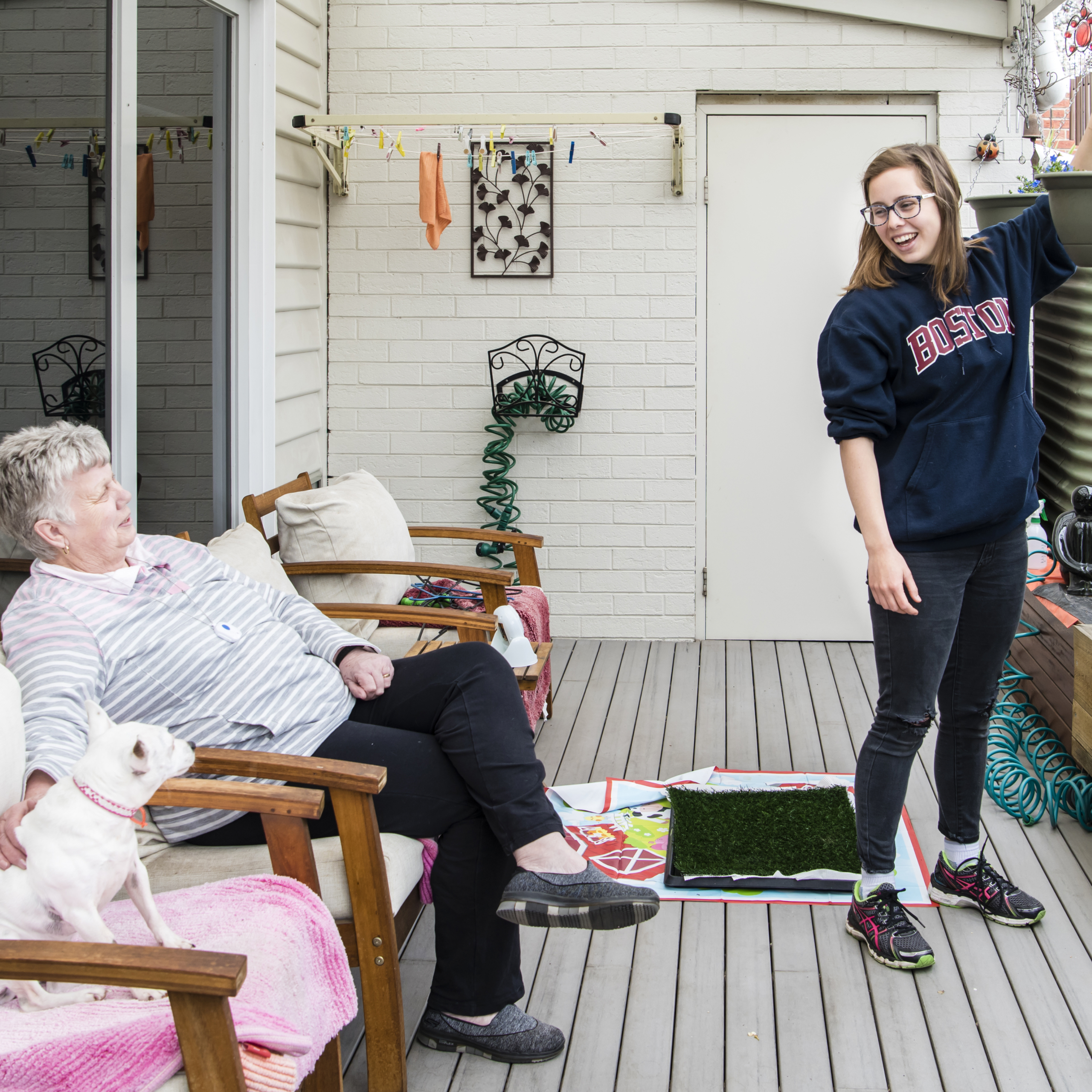
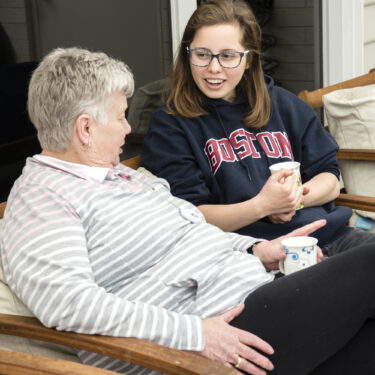
Lively helpers and older people supporting each other and learning together.
I’m interested in how a largely independent or autonomous society responds to a more collective and community-based approach to care and developing careers. Are there any learnings you can share with us on this?
This is such an interesting question! What we’ve observed is that there are a lot of entrenched understandings and assumptions of what care services look like, and how the care industry operates, and we need to invest a fair bit of time and energy upfront in really engaging with our young and older participants, as well as with our community partners, to help them understand the different approach that we’re trying to take. It’s not always easy to convey, but our experience has been that once people twig to the way we’re trying to do things, they’re so excited by it, and they really buy in. I think there’s a yearning in our community for a return to these more human and community-based ways of working and caring for each other, and my hope is that Lively will help lead the way and prompt broader movement in this direction across the industry.
What is next for Lively? How do you want to scale?
We’ve basically been in test and learn mode for the last four years, experimenting with various different program and service models to figure out how we can achieve our impact objectives while also being financially sustainable and scalable. This year, we’ve had the chance to take stock of what’s worked across these different program models, and what hasn’t, and we’ve been redesigning a core service model that we think hits the ‘sweet spot’. We’ll be launching and validating this model over the next six months, and then aim to start scaling up towards a national footprint. To do this, we’ve been inspired by the Buurtzorg model in the Netherlands and will be developing a ‘local team’ operating model that enables autonomous, self-managing teams of young people to establish, tailor and deliver Lively services in the unique contexts of their own local communities, in close connection and collaboration with other local service providers, community groups and networks; ensuring that Lively is able to remain responsive and connected to the many and diverse communities across Australia, rather than falling into the trap of becoming a big and unwieldy ‘machine’. It’s going to be an interesting and exciting journey!
